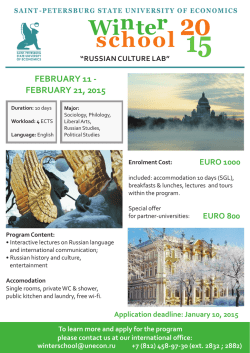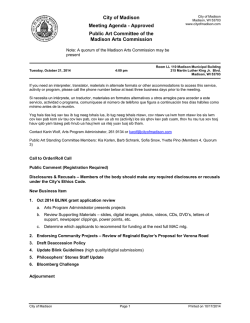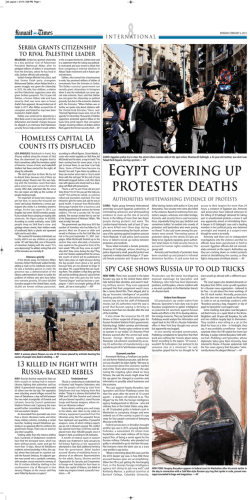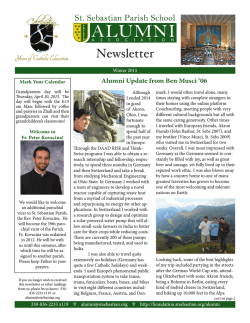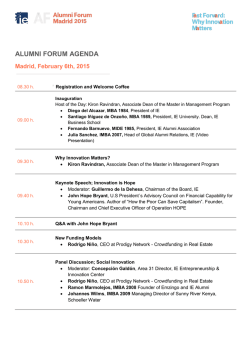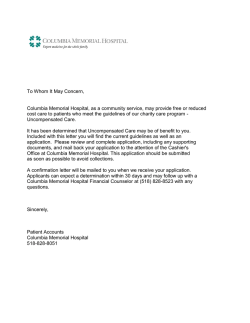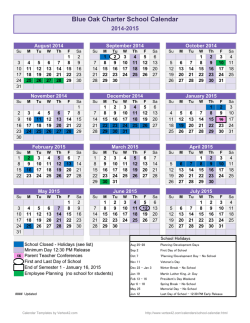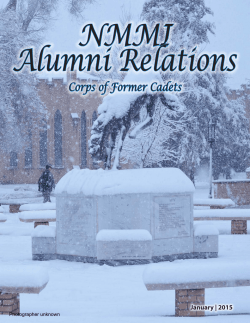
Winter 2015 - CREECA - University of Wisconsin–Madison
wiadomości вести haber vijesti xəbər новости zprávy xабар CREECA NEWS In This Issue: A Tribute to Alexander Rolich A Day in East & Central Europe Our biggest K-12 outreach event! page 2 Noted Slavic bibliographer page 4 Student Spotlight Nicole Butkovich Kraus A Look Back at Spring & Summer ‘14 page 5 page 8 Winter 2015 A Letter from the Director Ted Gerber D Ted Gerber Director, CREECA The CREECA Office is located at 210 Ingraham Hall 1155 Observatory Drive Madison, WI 53726 Phone: (608) 262-3379 Email: [email protected] We would love to hear from you! Facebook facebook.com/CreecaUWMadison Twitter @UWCREECA ecember greetings to our alumni, faculty, staff, students, and community members! I have taken the reins of the CREECA directorship while Yoshiko Herrera is on sabbatical and am pleased to report that the center is more vibrant and active than ever. This past spring, we hosted A Day in East and Central Europe, our biggest K-12 outreach event of the year. Please be sure to check out our photo wall from spring and summer 2014 for images of our Central Eurasian Studies Summer Institute and visiting students from Nazarbayev University. I am also especially delighted that we have received a rich trove of updates from our alumni. The successes of our alumni testify to the high quality of our students over the years, and we appreciate their willingness to share their experiences. For those of you who are in the Madison area, I hope to see you at our Thursday afternoon lecture series (full schedule at creeca.wisc.edu/events). However, if you miss a lecture, or live beyond driving distance to Madison, then fear not; there are a few different ways to catch up. Our website features audio recordings of most of our lectures and some video interviews with speakers too! Finally, as we were preparing this issue of the CREECA newsletter, official notification from the US Department of Education arrived with the good news that CREECA received federal Title VI grants for the next four academic years under the National Resource Centers (NRC) and Foreign Language and Area Studies (FLAS) Fellowship programs. This funding will allow us to continue supporting instruction in the critical languages of our region, to provide fellowships and scholarships to graduate and undergraduate students, and to build an active series of public outreach programs, such as lectures, conferences, workshops, and films. Ted Gerber Director, CREECA A Day in East and Central Europe Students from high schools throughout Wisconsin spend a morning exploring the history, culture, and politics of the region from a range of unique perspectives. O n a wintry March morning, nearly 300 students from Wisconsin high schools braved snow-jammed roads. They arrived at the University of Wisconsin-Madison eager to participate in a unique cultural and educational experience. Each year, outreach coordinator Nancy Heingartner organizes CREECA’s main public service event for high school students— a half-day mini-conference, focusing on one of the CREECA regions. In 2014, the students attended “A Day in East and Central Europe (DECE),” with the goal of learning about the countries within that region. The event represents one of the center’s primary missions— to conduct outreach and educate those beyond the University about the regions of Central and Eastern Europe, Russia, and Eurasia. “A Day in East and Central Europe” featured a keynote address by history professor Kathryn Ciancia on the Polish Solidarity movement and three breakout sessions presenting the languages, histories, cultures, and politics of various eastern and central European countries. CREECA News Nancy Heingartner (front), CREECA Outreach Coordinator, delivering closing comments at DECE. Folk music group ‘Intemperance Collective’ is also seen. 2 Michael Kuharski gathers the students together to perform a large circle dance at the wrap-up dance party. Heingartner brought together CREECA faculty and graduate students, as well as other colleagues and community members, to serve as presenters. She also worked with them to tailor their presentations for a high school audience. In addition, Heingartner communicated with all the teachers from participating schools, soliciting their input on breakout sessions. This year, Heingartner says, the attendance was nearly double that of years past. “The goal is to give the [juniors and seniors] a taste of some of these areas to which they have not been exposed,” said Heingartner. “The Wisconsin [high school] curriculum has very little room for any matters international.” She recollects a teacher telling her that in the course of an academic year, Russia is taught only for a day or two, while most of the countries of the CREECA regions are not covered at all. Bill Gibson, a history teacher at Madison East High School, says events such as DECE open up other avenues for learning. Following DECE, students in his Advanced Placement (AP) History class had to tackle a question on the AP exam about the Solidarity movement, a topic covered in the DECE keynote address. “The students who attended DECE got an extra bit of context,” Gibson said. Students listen intently to Kathryn Ciancia’s keynote address on the Polish Solidarity movement. Csanád Siklós, the assistant director of the European Union Center of Excellence, is one of the many University of WisconsinMadison colleagues who participated in the event as presenters. He called his talk, which focused on Hungary, “a concentrated glimpse,” giving students a sense of the country through a variety of themes such as its history, cultural activities, and sports. He kept the tone light, he said, despite having to deal with serious www.creeca.wisc.edu topics such as World War II and the Cold War. Siklós would like these experiences to help students view the world differently. “I hope they will increase their knowledge and awareness of international issues and look at the U.S. in a broader way within a global context,” he said. “[At DECE] kids step back and realize that they are a part of something important.” Juliana Olsen-Valdez, a senior at East High School, attended DECE for the first time this year. For her, studying history is a way to gain a deeper understanding of the world. “Kids get very centered on school and sports and forget that there are things happening,” she said. Olsen-Valdez adds that because of events such as DECE, “kids step back and realize that they are a part of something important.” At DECE students also gained cultural knowledge through a more participatory mode of instruction—dancing. These sessions were led by Michael Kuharski, whom Heingartner calls a “local folk dance legend.” “His presentations are ‘feet on’,” she joked, referring to fact that participants are actively learning the dances. Kuharski is a long-time supporter of CREECA and has been to so many outreach events that he says he’s lost count. He is well versed in the dances of many different regions— Scandinavian, Mexican, and Norse—but also specializes in Eastern European dances, especially from the Balkans. And he is a polyglot, speaking many of the languages of the region. Kuharski believes dance builds what he calls “ethnic partnerships”—people practicing and supporting other cultures. And he says he always senses excitement in the students. “You plant the seeds—artistic, cultural, and physical—which will sprout later on,” he said. “You open the window; there are always possibilities.” For Heingartner too, there is a personal desire to instill an appreciation of other cultures. “I always love it when I hear from students and teachers,” she said. “When they say ‘We’re so glad we came; can’t wait for next year; we really got a lot out of this,’ that means the world to me.” *** 3 Alexander Rolich (1923-2014): His Connections Built a Collection A tribute to a prolific bibliographer and a cherished member of the CREECA community. North Stacks, Memorial Library I t was a single moment of serendipity that brought Alexander Rolich (1923-2014) to the University of Wisconsin-Madison. While visiting a friend in Madison, Rolich chanced upon an announcement for a newly created position at Memorial Library. He applied, and in 1964 began a long and prolific career as the Bibliographer for Slavic, East European, and Central Asian Studies. In 1965 Rolich spent two-and-a-half months traveling through thirteen countries in Eastern and Western Europe to acquire rare and out-of-print books. On this journey he was accompanied by a lone travel companion—a trusty portable bibliographical apparatus. This was a time when the export of books, especially rare books, out of the countries behind the Iron Curtain was often tedious and at times nearly impossible for western buyers. Still, Rolich was able to acquire ‘several thousand’1 books during his trip. His literary haul included not only rare and out-of-print books, but also underground Russian publications from the early 1900s and books from the collection of the Polish Slavist Tadeusz Lehr-Splawinski. To aid in his efforts, Rolich enlisted the help of local distributors, dealers, and private sellers (some of whom found him, the only American in town!), and also by establishing or renewing connections with library exchange partners, such as the Insitut für Slawistik, in what was then East Berlin, and the National Library in Sofia. “He was a master with working on exchanges,” said Judith Kornblatt, Professor Emerita, Slavic Languages and Literature. “[For] things we couldn’t buy, he would do exchanges. He was like a miracle-maker.” Mark Beissinger, the founding director of CREECA 199298, and now the Henry W. Putnam Professor of Politics, Princeton University, describes Rolich’s method: “He established contacts throughout the former Soviet Union, sent extra books to those libraries—even provincial libraries in remote parts—and received books in exchange; sometimes books of relatively low circulation. That helped to develop the collection in an extraordinary way.” CREECA News At one point, the program had over a hundred foreign partners, according to David Henige, African Studies Librarian Emeritus, and Andy Spencer, who has been the Bibliographer for Slavic, East European, Central Asian, and Middle Eastern Studies since 2002. Many of these relationships remain today. “He was a master with working on exchanges.” Rolich was always surrounded by books. James Bailey, Professor Emeritus, Slavic Languages and Literature, chuckles gently as he recollects the image of Mr. Rolich’s office at Memorial Library, where books would forever be piled high in stacks or spilling out of shelves. Bailey often visited this bookfilled room; sometimes to collect a book that had recently arrived, and sometimes just to chat with his friend. After they retired they continued their friendship, lunching together every two weeks as a part of a group of local retirees. A framed photograph of Rolich sits in Bailey’s study. Rolich formed many strong relationships within the university community. When Uli Schamiloglu first interviewed for a position at UW-Madison in the late 1980’s, his tour guide at the library was Alexander Rolich. Schamiloglu describes him as a warm and caring person. “He made me feel very comfortable when I came here,” he said. “I always enjoyed talking to him. We always ended up smiling and laughing a lot.” Judith Kornblatt also met Rolich just as she was starting as a new professor. Rolich was always ready to order books or help in any way. She describes his personality as “endlessly curious” and eager to learn about the work that others did. “He wanted to be involved,” said Kornblatt. “He was 4 important for my work. It was his personality; he sincerely wanted to know.” The results of Rolich’s years of work and indefatigable efforts endure in many parts of Memorial Library. He was instrumental in building the Library’s Russian Satirical Journal collection, its Russian Folklore collection, and in acquiring the space for the Petrovich Reading Room—a large, sunny space on the second floor which houses a study area and many thousand reference materials. Even today, much of Rolich’s bibliography work is being catalogued and making its way into the UWMadison Digital Collections. Rolich leaves behind a rich legacy, both the intangible—the memories that his friends and former colleagues hold dear— and the tangible literary treasures at Memorial Library. In recounting the details of his 1965 trip to Europe that was only the beginning of his influential career, Alexander Rolich said, “To the extent that my desiderata lost weight during the trip, the Memorial Library has gained several thousand volumes of out- of-print Russian books that would not otherwise have entered our holdings. Perhaps to the same extent have contacts been made for useful exchanges with libraries in Eastern Europe offering OP (out-of-print) materials in the different Slavic languages. The residual impact of such a trip should continue for some time to come.”1 *** 1. Rolich, Alexander. “Odyssey of a Slavic Bibliographer’. Friends of the Library The University of Wisconsin Messenger. No. 7 (May, 1966): 2-7 Print. (http://go.wisc.edu/g59w92) Mr. Rolich’s obituary can be found on the Gunderson Funeral Home website: http://www.gundersonfh.com/obituaries A fund in memory of Alexander Rolich has been set up for the purchase of Slavic print materials at the UW-Madison Memorial Library. (UW Foundation-Alexander Rolich Memorial Fund; US Bank Lockbox 78807, Milwaukee, WI 53278). Student Spotlight Nicole Butkovich Kraus In each issue of our newsletter we introduce one of our exceptional students. Meet Nikki Kraus, who completed her Ph.D. in Sociology and a Graduate Certificate in REECAS in summer 2014. N ikki Kraus always thought she would become a cardiologist. This, in spite of the fact that as a sixth grader she had read W. Bruce Lincoln’s book Red Victory: A History of the Russian Civil War and was singing in a Slavic polka band with her father and brother. Luckily for CREECA, she followed her interest in Russian history. Nikki started as an Assistant Professor of Sociology at Rutgers-Newark in fall 2014. *** Tell us about your research interests. Nicole Butkovich Kraus at the Kazan Kremlin. (Photo courtesy Nikki Kraus) Meeting and working with CREECA faculty [...] has given me a broader sense of the field and an admiration for how many great people we have working on issues surrounding the former Soviet Union. www.creeca.wisc.edu In terms of my research, I am broadly interested in what drives and sustains social inequality. In particular, my dissertation focuses on how Russians view a variety domestic and international groups. I analyze survey data from individuals, but I try to connect it to broader patterns of inclusion and exclusion from sociological research. The Russian Federation is a great place to explore these issues given its rich multicultural history, need for immigrant labor, and ongoing geopolitical importance. You have been actively involved in organizations beyond the UW-Madison (such as ASEEES and SSRC). Would you elaborate on your experiences and the importance of such activities? Through SSRC, I received support first to attend a field-building workshop [which brought together students and faculty from various universities to discuss and develop projects] and later a dissertation fellowship. SSRC has also provided a variety of 5 Careers professional contacts that have endured over the years and led to publication opportunities. ASEEES is a nice place to present your work, interact with others from a variety of disciplines, and get more interdisciplinary feedback from experts in the area. The Association for the Study of Nationalities at the Harriman Institute has also been a great place to present and to see others’ work. Conferences can inspire you with new ideas, energy, and research contacts for future projects. The CREECA Lecture Series brings speakers from diverse fields, many of whom are also alumni. These individuals are exceptional role models for our students and provide insights into the career paths available for those who focus on area studies. You won the L&S teaching fellowship last year. What do you look forward to most as you continue your teaching career as Assistant Professor of Sociology at RutgersNewark? I had a great experience meeting students after the talk I gave at Rutgers-Newark. They struck me as an energetic and inquisitive group of people from a variety of national, class, and racial backgrounds. I’m excited to work with students that may have a very different perspective from many UW undergraduates. Rutgers also has an MA program in Peace and Conflict studies, so I am looking forward to becoming a part of that initiative and others on campus. The department has such a bright and collegial atmosphere; I really can’t wait to get started. We have loved Madison and UW, and will always be Badgers, though we are happy to start our next adventure in New Jersey. Apparently, I’m just meant to wear red! Conferences can inspire you with new ideas, energy, and research contacts for future projects. What are some highlights from your time at the UWMadison? In the course of a graduate career, so many things happen that it is difficult to name only a few events. Coming here to work with my advisor, Ted Gerber, was a wonderful opportunity, and I have appreciated his ongoing support. Meeting and working with CREECA faculty (Kathie Hendley, Bob Kaiser, David McDonald and others) has given me a broader sense of the field and an admiration for how many great people we have working on issues surrounding the former Soviet Union. I have also appreciated opportunities to meet visiting CREECA scholars such as Bill Pridemore and Veljko Vujacic. Yoshiko Herrera’s class on post-communist politics was exceptional, and our subsequent relationship has been invaluable to me. I have also benefitted from an expansive and top-notch sociology faculty including Myra Marx Ferree, Mara Loveman, and so many others. *** CREECA News Alumni Marina Zaloznaya (L) and Christopher Kolenda (R). “B ehind the CREECA Lectures” is a series of short videos featuring conversations with some of our guest speakers. The videos are an exploration. We get to know the speakers and hear about what drives them to pursue their field of study and how they work. With each conversation, a different perspective emerges on the pursuit of area studies. In spring 2014, the speakers included two returning alumni— Marina Zaloznaya and Chistopher Kolenda. Zaloznaya (M.S. ‘07) is an assistant professor at the University of Iowa. She studies corruption, white-collar crime, and economic deviance. In her lecture she focused on post-Soviet Ukraine and the participation of ordinary citizens in petty bureaucratic corruption. Kolenda (M.A. ‘96) led four tours in Afghanistan and led the team that produced the McChrystal report. In his talk he described the changing U.S. strategy in Afghanistan and the future of the nation. The videos can be seen at http://vimeo.com/channels/693063 *** CREECA STAFF Director Ted Gerber Communications Assistant Aparna Vidyasagar [email protected] [email protected] Associate Director Jennifer Tishler Events Coordinator Ainsley McNerney [email protected] [email protected] Outreach Coordinator Nancy Heingartner Webmaster Grant Herrman [email protected] [email protected] Financial Specialist Maki Raymo [email protected] 6 Updates from the CREECA Community Faculty, Staff, Students, and Alumni Faculty and Academic Staff Maria Belodubrovskaya (Communication Arts) published an article on Stalin-era cinema, “Soviet Hollywood: The Culture Industry That Wasn’t,” in Cinema Journal 53:3 (Spring 2014). Graduate Students Molly Thomasy Blasing (Slavic) successfully defended her PhD dissertation, “Writing with Light: Photo-poetic Encounters in Tsvetaeva, Pasternak and Brodsky,” on May 15, 2014. She joined the Department of Modern and Classical Languages, Literatures and Cultures at the University of Kentucky this fall as an Assistant Professor of Russian. Melissa Miller (Slavic) was awarded an associateship with the Summer Research Lab on Russia, Eastern Europe and Eurasia at the University of Illinois. Daniel Singleton (Foreign Area Officer, REECAS M.A. ‘14) published an article titled “The Cyber Battlefield” in Per Concordiam 5:2 (June 2014) in both English and Russian. University’s Robert H. McKinney School of Law, recently published the book Guardians of the Law?: The German Prosecution Service (Springer 2014). Geraldine Kelley (Ph.D ‘76), of Notre Dame University, translated a series of biographies of Catholic clergy and laity under the Lenin and Stalin regimes. This expansive online collection is titled “Book of Remembrance: Biographies of Catholic Clergy and Laity Repressed in the Soviet Union (USSR) from 1918-1953” and is presently available at https://biographies. library.nd.edu. When completed, the project will contain 1878 biographies. moved to Krakow, Poland this September to begin the M.A. program in Transatlantic Studies at Jagiellonian University. She will graduate in Spring 2016. On a special note, Maria Vishnevsky, our exceptional, long-time Events Coordinator, is in Almaty, Kazakhstan for the 2014-2015 academic year to participate in the UW-Madison Russian Flagship capstone program. Maria is majoring in Russian and political science and will be graduating in 2015. We wish her the very best and much success in all her future endeavors. She will be greatly missed at CREECA. *** Gerald E. Mikkelson (B.S. ‘59, M.A. This is just a small sample of the ‘63, Ph.D. ‘71) recently received the excellent work being done by CREECA Petropol Award for outstanding contribution faculty, staff, students, and alumni. to the cultural and educational life of St. We will feature more updates in our Petersburg. He has previously received upcoming electronic and print an honorary doctorate from the School of newsletters. Philology of St. Petersburg State University (2001, for teaching, scholarship, Please send your submissions to and cultural exchange), and CARTA [email protected] (Central Association of Russian Teachers of America) Excellence in Teaching Russian Award (2008). Alumni Shawn Boyne (Ph.D. ‘07), who is Shannon Tanski (REECAS Undergraduate currently Professor of Law at Indiana Certificate & B.A. International Studies 2012) Make a Contribution to CREECA! Every gift enables CREECA to do something we could not otherwise have accomplished; whether it is support for undergraduate and graduate students, an additional lecture, or a course development grant. All gifts are tax-deductible. Make a donation by mail: Please make checks payable to the UW Foundation and include “12544273 CREECA” on the memo line of the check. Send to: University of Wisconsin Foundation Gift Processing Department U.S..Bank Lockbox P.O. Box 78807 Milwaukee, WI 53728-0807 www.creeca.wisc.edu Make a donation online: To make a secure gift online using your credit card, please visit www.creeca.wisc.edu and click on 7 Nonprofit Org. U.S.Postage PAID Permit #658 Madison, WI CREECA 210 Ingraham Hall 1155 Observatory Drive Madison, WI 53706 Top Row: (Left to Right) CREECA faculty roundtable on Russian military intervention in Ukraine and the international response, March 10, 2014. Director Anna Ferens at the screening of her documentary “A Place to Stand,” March 25, 2014 [Photo credit: Irena Frączek].Visiting students from Nazarbayev University in Kazakhstan at the Madison home of Professor Emeritus John Witte, July 27, 2014. Bottom Row: (Left to Right) Students of Kazakh share a lighter moment at the Central Eurasian Studies Summer Institute (CESSI), July 2014. High-school participants dancing at “Day in Central and East Europe,” March 2014. Students of elementary Uzbek respond to instructor Khulkar Matchanova during CESSI, July 2014. CREECA News 8
© Copyright 2026
